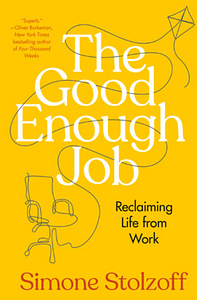You need to sign in or sign up before continuing.
Take a photo of a barcode or cover
hopeful
informative
inspiring
medium-paced
hopeful
informative
reflective
fast-paced
emotional
hopeful
informative
inspiring
lighthearted
reflective
medium-paced
informative
hopeful
informative
inspiring
reflective
fast-paced
"One day, Morrison was complaining to her father about cleaning rich people’s houses when her dad put down his coffee and said, “Listen. You don’t live there. You live here. With your people. Go to work. Get your money. And come on home.” Morrison later wrote about the impact of her father’s words in The New Yorker. “Since that conversation with my father I have never considered the level of labor to be the measure of myself,” she recalled. “I have never placed the security of a job above the value of home.” Morrison’s work was important, but it was her livelihood, not her life. When I think about what it means to have a good enough job, I think about Morrison’s father’s wisdom: Go to work. Get your money. Come on home."
informative
inspiring
fast-paced
informative
reflective
medium-paced
Meh, this one fell a flat for me. I was really hoping it would address the notion of contentment at work (something I have really been working to achieve), give some helpful tips to avoid perfectionism/burnout, and share tangible strategies to help disconnect from work. I didn’t get any of those three.
Instead, I got a Silicon Valley bro waxing poetic in 9 vignettes of privileged people who had the economic means to quit their high paying jobs because they were already financially secure thanks to said high paying jobs. Stolzoff very much focused on the coastal elite, and made sure to remind us of that with excessively frequent references to California.
The book makes cursory references to the growing inequities in the labor market, but doesn’t tackle them in a meaningful way, nor provide any in-depth experiences from people who have experienced them. Stolzoff admittedly says that he heard the book toward these people and recognizes his shortcomings, but it felt more like lip service with a hint of dismissed ness.
It was interesting to read people’s career journeys, and honestly pretty fulfilling to realize that my fun (albeit dysfunctional at times) <$50k a year non-profit job avoids most of the pitfalls he mentions while leaving me fulfilled, energized (and supported) to pursue personal passions, and with enough money to pay the bills. But most of this was driven by my personal thinking prior to reading this book. That said, it was well-written and an easy read.
I suppose it could be a valuable read for people who have never thought critically about their work and have just unquestioningly climbed the socially-expected ladder of “success” their whole career, but for me, it didn’t ring true to my experiences and I found myself increasingly annoyed by the unaddressed privilege and lack of relatability.
Instead, I got a Silicon Valley bro waxing poetic in 9 vignettes of privileged people who had the economic means to quit their high paying jobs because they were already financially secure thanks to said high paying jobs. Stolzoff very much focused on the coastal elite, and made sure to remind us of that with excessively frequent references to California.
The book makes cursory references to the growing inequities in the labor market, but doesn’t tackle them in a meaningful way, nor provide any in-depth experiences from people who have experienced them. Stolzoff admittedly says that he heard the book toward these people and recognizes his shortcomings, but it felt more like lip service with a hint of dismissed ness.
It was interesting to read people’s career journeys, and honestly pretty fulfilling to realize that my fun (albeit dysfunctional at times) <$50k a year non-profit job avoids most of the pitfalls he mentions while leaving me fulfilled, energized (and supported) to pursue personal passions, and with enough money to pay the bills. But most of this was driven by my personal thinking prior to reading this book. That said, it was well-written and an easy read.
I suppose it could be a valuable read for people who have never thought critically about their work and have just unquestioningly climbed the socially-expected ladder of “success” their whole career, but for me, it didn’t ring true to my experiences and I found myself increasingly annoyed by the unaddressed privilege and lack of relatability.


